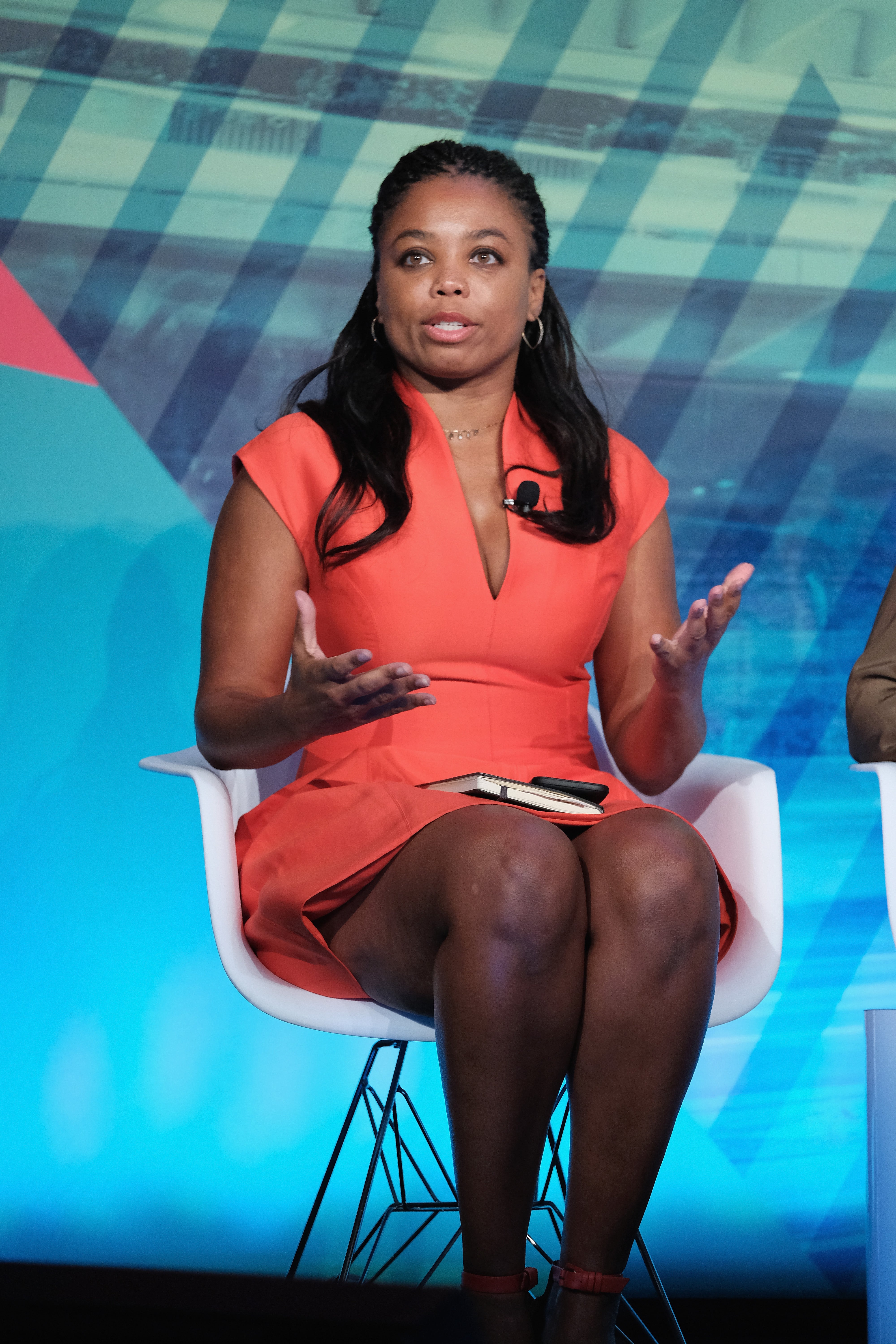
Last year should have been the happiest one of Jemele Hill’s life.
After working professionally as a sports journalist for 20 years and spending the last 11 steadily sharpening her skills at ESPN’s sprawling campus in Bristol, Connecticut, the 42-year-old finally received the dream assignment. Hill and her cohost, Michael Smith, were hand-chosen to bring their personalities and the chemistry they displayed in their popular His & Hers sports program to SC6, the holy grail of SportsCenter’s prime-time 6 P.M. spot.
Years of constantly proving herself to be just as capable, just as knowledgeable and just as eloquent as the men around her seemed to finally pay off. Even Black women who aren’t sports fans recognized the enormity of this breakthrough moment.
Like many of us, she was never supposed to make it this far.
Born in Detroit, Hill was raised on welfare by a single mother who struggled with substance abuse. The one mainstay was her grandmother Naomi Webb, whom Hill calls her “rock.” After taking a high school journalism class and serving as an apprentice at the Detroit Free Press, she was hooked. In 2006 she was hired as a columnist for ESPN.com, where she grew her fanbase and sealed the respect of ESPN’s top brass, her coworkers and peers.
It appeared everything was going well until this past September when Hill sent a series of tweets, one of which said President Donald Trump is “the most ignorant, offensive president of my lifetime. His rise is a direct result of White supremacy. Period.”
Although there are numerous examples that seem to illustrate this description (attesting that Mexican immigrants are rapists who contribute nothing but drugs and crime to our country, and laying the blame on “many sides” during the violent protests in Charlottesville, Virginia), Hill was lambasted by White House Press Secretary Sarah Huckabee Sanders, who said, “That is one of the more outrageous comments anyone could make and certainly something that I think is a fireable offense by ESPN.”
The intersection of sports, race and politics is nothing new. In fact, it’s even more poignant these days, as more athletes voice their concerns about the direction our country is going in. And while Hill was hired for her deft sports analysis, she certainly isn’t the only journalist to publicly criticize the President. So why was she singled out?
“I have thought about that so many times because I wasn’t the first person to say it,” admits Hill with resolve, sitting in a conference room at ESPN headquarters. “There is factual evidence to support what I said, so I was very surprised by the reaction.”
While she stands behind her statements, Hill does believe she was targeted by the White House because of where she works. After all, her role as a commentator at ESPN is to criticize the game, not our current leader. But, in a déjà vu moment, Hill found herself in the middle of another Twitter-induced firestorm just a few weeks later. This time her tweets were in response to a threat made by Dallas Cowboys owner Jerry Jones, who said he would bench any of his players disrespecting the American flag—a notion erroneously linked to several ballers who had recently knelt in protest during the national anthem.
Hill’s tweet suggested that NFL fans boycott Jones’s sponsors, citing that “change happens when advertisers are impacted.” Her actions were in defiance of the social media policy of ESPN (which is owned by the Walt Disney Co.), and she was immediately suspended, sending shock waves throughout the country and the Web.
“While I don’t believe in regrets, I believe there is an opportunity to learn from every situation, even if it’s a painful one,” says Hill. “My suspension was certainly awkward at times. I remember the first day walking into a restaurant and seeing myself on both Fox News and CNN. I’m used to being seen on ESPN, but to have people outside of the sports bubble talking about me as a walking think piece was weird. As is the case when you experience something difficult, you have to cling to those who love and support you the most.”
At the top of that list is her cohost and confidant, Michael Smith, who, following the announcement of Hill’s suspension, refused to appear on the SC6 broadcast without her. Her mentor, Johnette Howard, an award-winning author and sports columnist, immediately advised Hill simply to ignore the noise swirling around her.
“Jemele has been through some rough times and found herself at junctures in life where she had to choose who she is,” says Howard, who has known Hill for more than 25 years. “When I first met her, I was struck by her obvious intelligence and sense of self-possession. Even then she knew who she was and she wasn’t going to let the world distort her.”
When it comes to sports commentary, Hill and Smith are at the forefront of what’s fresh, authentic and exciting. This experience may have raised her public profile, but that was never her intention. Moving past the suspension and notoriety, Hill has a newfound desire to be even more true to herself as an individual, a Black woman and a professional.
“I have a firmer understanding of who I am. I have always been a self-aware person, but you don’t know what you are made of until that test actually comes,” says Hill. “Now I feel like I’ve gained clarity. When you are thrown into the fire in this kind of way, you figure out very quickly exactly what you’re about.”